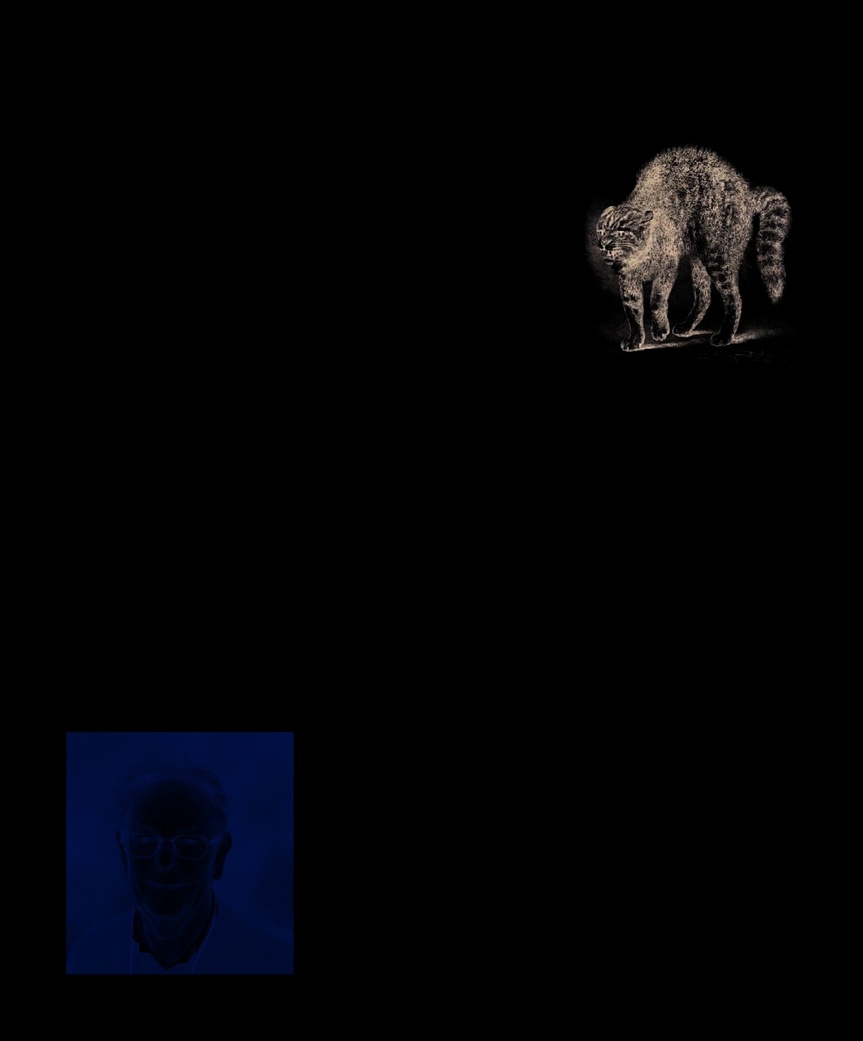The Psychology Book (102 page)
Read The Psychology Book Online
Authors: Unknown

to specific work-related roles.
stayed there for 30 years,
power is on behalf of a company
McClelland’s ideas revolutionized
becoming Chairman of the
or an organization. Someone with
business recruitment, and although
Department of Social Relations.
a strong drive for personal power
his intensive methods of assessing
In 1963, McClelland set
up a business management
may make a poor team player.
job applicants have lost some of
consultancy, applying his
High quality work, McClelland
their popularity, the basic principles
theories to assist company
thought, stems from the need for
endure. Motivation is now seen as
executives in the assessment
achievement, which is therefore
critical to performance at work. ■
and training of staff. In 1987,
a far more accurate predictor of
Boston University made him
job success than intelligence.
a Distinguished Research
The drive to achieve, he believed,
Professor of Psychology, a
is what gives people a competitive
position he held up to his
edge, helping them to stretch for
death at the age of 80.
new goals and improve.
Lastly, McClelland claimed that
Key works
the need for affiliation—to have
good relationships with others—
1953
The Achievement Motive
helps people to work well within a
1961
The Achieving Society
1973
Testing for Competence
team. He also noted that people with
Rather Than for Intelligence
a pronounced need for affiliation are
The Thematic Apperception Test
1987
Human Motivation
unlikely to be successful managers.
was promoted by McClelland as a way of
1998
Identifying Competencies
McClelland pointed out that
assessing job candidates. Telling a story
with Behavioral-Event
motivation stems from personality
based on a series of images was thought
Interviews
traits that are deeply embedded in
to uncover people’s true motives.

324
EMOTION IS AN
ESSENTIALLY
UNCONSCIOUS
PROCESS
NICO FRIJDA (1927– )
situation has changed, as scientific
IN CONTEXT
findings regarding the “site” of
emotions have led to renewed
APPROACH
O
ur emotions and feelings
are idiosyncratic; they seem
to be purely subjective, and
the mysticism surrounding them
interest. Evolutionary psychologists
Psychology of emotion
may explain why the psychology of
have also posed questions. What is
BEFORE
emotion has advanced so slowly.
the purpose of emotions? How have
But during the last 30 years, this
1872
Biologist Charles Darwin
they helped us survive and thrive?
publishes the first scientific
study of human emotions
in
The Expression of the
Emotion is an essentially unconscious process.
Emotions in Man and Animals
.
Late 1800s
William James
and Danish physiologist
Carl Lange propose the
Emotions
are motivating
Feelings
are how we interpret
James–Lange theory of
forces, preparing us for action.
the emotions we experience.
emotion: that emotions are
the result of bodily changes,
and not the cause of them.
1929
Physiologists Walter
Cannon and Philip Bard say
They are
spontaneous
We are
consciously aware
of
we experience physiological
biological processes
that
our feelings and can make
arousal and emotion at the
are out of our control.
decisions
based on them.
same time, in the Bard–
Cannon theory.
AFTER
1991
In
Emotion and
Adaptation
, psychologist
They can be
understood by
As we have control of our
others
through spontaneous
Richard Lazarus says a thought
feelings,
others cannot
physical expression,
guess
at our feelings
must precede any emotion or
such as laughter.
through our behavior.
physiological arousal.

PSYCHOLOGY OF DIFFERENCE 325
See also:
William James 38–45 ■ Albert Ellis 142–45 ■ Gordon H. Bower 194–95 ■ Charlotte Bühler 336 ■
René Diatkine 338 ■ Stanley Schachter 338
Nico Frijda’s groundbreaking book,
about it. We are not suddenly
The Laws of Emotion
, explores
hijacked by our feelings as we are
the substance and rules of
by our emotions.
emotions. He sees them as lying
at the crossroads of biological and
Action and thought
cognitive processes: some, such
Frijda points out that emotions and
as fear, are biologically inherent
feelings are also displayed differently.
or innate, and these basic emotions
Emotions prepare us for action; in
are the ones we share with other
situations that induce fear, they are
animals. Others arise in us in
motivating forces that prepare the
response to thoughts, so are clearly
body to flee or stand and fight. Other
cognition-based. They may even—
people are able to understand, or at
as in the case of indignation or
least guess at, our emotions from our
humiliation—be shaped by culture.
behavior. Feelings, however, may or
Emotions, such as fear
, Frijda says,
Frijda makes clear distinctions
may not be consistent with
are always “about something.” They are
between emotions and feelings.
behavior, because we can choose
spontaneous responses to changing
Emotions are beyond our control;
to behave in a way that hides them.
circumstances, and reveal much about
they spontaneously arise and alert
Frijda sees the basic emotions
our relationship with our environment.
us to their presence by physical
as an opportunity for greater self-
sensations, such as a tightening
awareness. They accompany a
In defining and describing a very
in the gut when we feel fear. For
biological arousal that makes us
specific set of laws by which
this reason he says that “emotion
notice them and become more
emotions operate, Frijda shows that
is an essentially unconscious
aware of our feelings. This allows us
they emerge, wax, and wane in a
process.” Feelings, on the other
to factor them into choices we make,
predictable way. Reason interprets
hand, are our interpretations of
and with honest reflection, to deepen
them like a barometer, to ensure our
whatever emotions we are
self-awareness. But Frijda confines
mental well-being. “Our emotional
experiencing, and have a more
basic emotions to anger, joy, shame,
selves and reasonable selves are not
conscious element to them. When
sadness, and fear. Others, such as
compartmentalized,“ Frijda says,
we feel something, we are able to
jealousy and guilt, do not have the
“on the contrary, they are connected
have thoughts and make decisions
same biological imperative.
much more than they seem”. ■
Nico Frijda
Nico Henri Frijda was born in
teaching. For the next 10 years
Amsterdam to an academic Jewish
he was assistant professor at
family, and lived in hiding as a
the University of Amsterdam,
child to avoid the persecution of
then professor in experimental
the Jews during World War II. He
and theoretical psychology.
studied psychology at Gemeente
Frijda has held visiting posts
Universiteit, Amsterdam, where he
in universities across Europe,
was awarded a PhD in 1956 for
including Paris, Italy, Germany,
his thesis
Understanding Facial
and Spain. He lives with his
Expressions
. He attributes his
second wife in Amsterdam.
initial interest in emotions to
being in love, as a student, with
Key works
“a very expressive girl.”
From 1952 to 1955 Frijda
1986
The Emotions
worked as a clinical psychologist at
2006
The Laws of Emotion
the Dutch Army Neurosis Centre,
2011
Emotion Regulation and
before returning to research and
Free Will

326
BEHAVIOR WITHOUT
ENVIRONMENTAL
CUES WOULD BE
ABSURDLY CHAOTIC
WALTER MISCHEL (1930– )
IN CONTEXT
APPROACH
U
ntil the late 1960s,
Raymond Cattell identified 16
personality was most
different personality traits; Hans J.
often described as a series
Eysenck suggested there were only
of individual behavioral traits
three or four. In 1961, Ernest Tupes
Personality theory
that were genetically inherited.
and Raymond Christal proposed
BEFORE
Psychologists worked to define
that there are five major personality
and measure these traits, because
traits (the “Big Five”): openness,
c.400 BCE
Ancient Greek
this was thought to be essential
conscientiousness, extraversion,
physician Hippocrates
to understanding and reliably
agreeableness, and neuroticism or
suggests personality depends
predicting a person’s behavior.
emotional stability. Then, in 1968,
on the levels of the four
humors in the body.
1946
Raymond Cattell begins
developing his 16-factor model
of personality.
How can
behavior
be
predicted?
1961
American psychologists
Ernest Tupes and Raymond
Christal propose the first “Big
Five” personality-factor model.